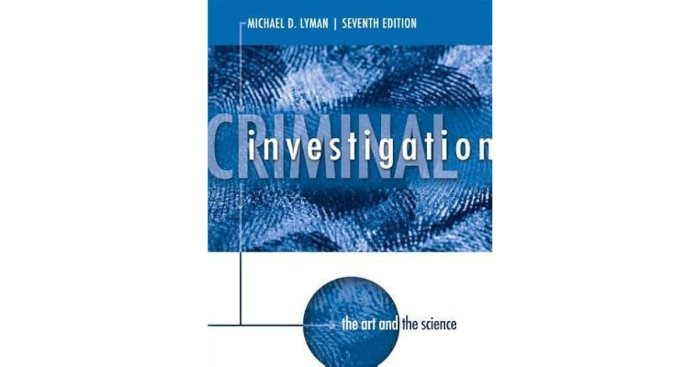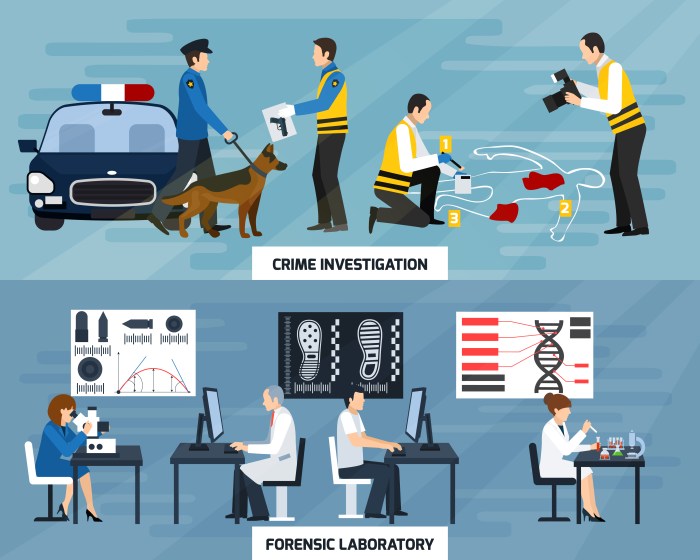Criminal investigation the art and the science 9th edition pdf – Criminal Investigation: The Art and the Science, 9th Edition PDF, offers a comprehensive exploration of the field, providing readers with an in-depth understanding of the principles, practices, and challenges of modern criminal investigations. This authoritative text delves into the intricacies of crime scene investigation, physical evidence collection and analysis, interviewing and interrogation techniques, investigative report writing, and specialized topics in criminal investigation, equipping readers with the knowledge and skills necessary to navigate the complexities of criminal investigations.
As technology continues to reshape the landscape of criminal investigations, this 9th edition remains at the forefront, providing insights into the latest advancements and their impact on investigative practices. With a focus on both the art and the science of criminal investigation, this text empowers readers to develop a comprehensive understanding of the field, enabling them to effectively contribute to the pursuit of justice.
1. Introduction

Criminal investigation plays a pivotal role in law enforcement, providing the foundation for solving crimes and bringing perpetrators to justice. Over time, advancements in technology and scientific methods have revolutionized investigative techniques, enhancing the ability to uncover evidence and establish the truth.
This edition of “Criminal Investigation: The Art and the Science” is structured to provide a comprehensive understanding of the field. It begins with an overview of the principles and practices of criminal investigation, followed by detailed chapters covering crime scene investigation, physical evidence, interviewing and interrogation, investigative report writing, and special topics in criminal investigation.
2. Crime Scene Investigation

Crime scene preservation and documentation are crucial to ensure the integrity of evidence and the accuracy of the investigation. Crime scene photography and sketching provide a permanent record of the scene, while forensic science plays a vital role in analyzing physical evidence, such as DNA, fingerprints, and trace elements.
Methods of Crime Scene Investigation
- Preservation and documentation
- Photography and sketching
- Forensic science
3. Physical Evidence
Physical evidence is classified and collected based on its potential relevance to the investigation. The chain of custody ensures the integrity and authenticity of evidence throughout the investigative process. Common types of physical evidence include fingerprints, DNA, firearms, and drugs.
Chain of Custody
- Importance
- Procedures
- Documentation
4. Interviewing and Interrogation

Effective interviewing and interrogation techniques are essential for obtaining information from witnesses and suspects. Different approaches are used depending on the type of individual being interviewed. Legal and ethical considerations must be carefully observed to ensure the admissibility of evidence.
Principles of Interviewing and Interrogation, Criminal investigation the art and the science 9th edition pdf
- Establishing rapport
- Asking open-ended questions
- Active listening
- Evaluating credibility
5. Investigative Report Writing: Criminal Investigation The Art And The Science 9th Edition Pdf

An investigative report is a comprehensive account of the investigation, providing a detailed record of the facts and evidence gathered. It should be accurate, clear, and objective, utilizing tables, charts, and other visual aids to enhance readability and effectiveness.
Elements of an Investigative Report
- Introduction
- Statement of facts
- Analysis of evidence
- Conclusions and recommendations
Q&A
What are the key principles of effective interviewing and interrogation?
Effective interviewing and interrogation involve establishing rapport, active listening, and utilizing appropriate questioning techniques while adhering to legal and ethical guidelines.
How does forensic science play a role in crime scene investigation?
Forensic science provides crucial support in crime scene investigation through the analysis of physical evidence, including DNA, fingerprints, and trace evidence, to identify suspects, establish timelines, and reconstruct events.
What is the importance of maintaining the chain of custody in physical evidence collection?
The chain of custody ensures the integrity and authenticity of physical evidence throughout the collection, handling, and analysis process, preventing contamination or tampering and preserving its evidentiary value.